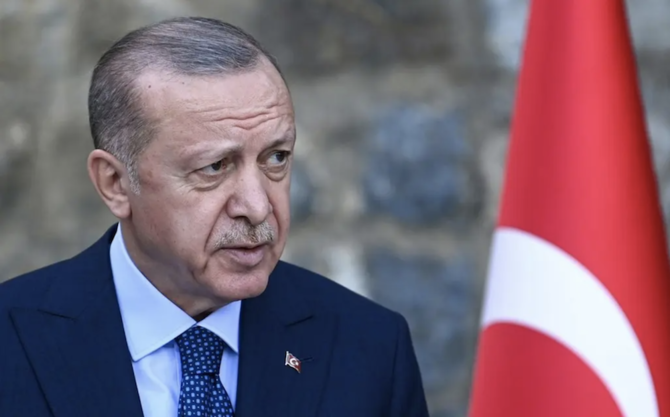
- ARAB NEWS
- 12 Jul 2025

After months of collaboration, the leaders of Turkey’s six opposition parties have signed a historic pact that aims to overhaul electoral laws and institutions and end President Recep Tayyip Erdogan’s almost two decades of rule. The pact is the most significant event so far in efforts by Erdogan’s rivals to unite against him, and also marked the first time in Turkish political history that a coalition of political parties had announced their post-election goals.
Despite its members’ starkly different political and ideological backgrounds, the coalition is the strongest political force to challenge Erdogan in critical elections next year. Their pact calls for a return to the parliamentary system that was in effect from 1923 to 2017. The pact also addresses women’s rights, political ethics, social policies, the environment, and media rights and freedoms. Overall, it is a common vision statement that sends signals about what this opposition coalition will do if they come to power.
However, there was no emphasis on foreign policy, so it is important to shed light on the stances of the six opposition leaders in order to understand whether their coalition can arrive at a common foreign strategy. Can such a fractured coalition manage Turkey’s foreign policy at a time when the country is already facing diverse political and economic problems?
All six opposition parties promise a new foreign policy in which diplomacy and good neighborly relations will replace adventurism and populism. However, regardless of which party rules the country, with changing global and regional dynamics the future Turkish government is likely to face the same structural issues as the current one.
On the regional level, the conflict in Syria is likely to continue challenging Turkey’s security. Republican People’s Party leader Kemal Kılıçdaroğlu is among the fiercest critics of the government’s Syria policy, and pledges that if his secularist CHP takes power it will normalize relations with the Assad regime and end the “tragedy” of Syrian refugees in Turkey, sending them back within two years.
Under Erdogan’s leadership, Turkish foreign policy has been radically transformed, and become more personalized.
Sinem Cengiz
Right-wing IYI Party leader Meral Akşener, the only woman in the opposition coalition, has also pledgedrepatriation of Syrian refugees, which has become a main source of public dissatisfaction. Felicity Party leader Temel Karamollaoğlu whose party traces its roots to the Islamist (and now defunct) Welfare Party, is another critic of the government’s Syria policy in particular and Middle East policy in general.
However, normalizing relations with the Assad regime is an issue that is likely to cause friction within the coalition. Future Party leader Ahmet Davutoğlu, who was the mastermind of Turkey’s Syria policy when he was foreign minister, is the main critic of the Assad regime and stands by his ideals on Turkish foreign policy. In addition to Syria, Turkey’s involvement in Libya, relations with Egypt and Israel, and the reconciliation process with the Gulf states are the other areas in which the opposition groups have points of convergence as well as divergence.
Relations with the EU are another significant issue. Kılıçdaroğlu has called on the EU to revive Turkey’s long-stalled full membership process, and he recently met EU ambassadors in Ankara to share his post-election goals. This was not only an attempt to obtain support from Western countries, but also a reflection of his party’s recent foreign policy strategy.
DEVA Party leader Ali Babacan, who was economy minister from 2002 to 2007 and then led the foreign ministry until 2009, also supports reviving Turkey-EU relations. Erdogan appointed him chief negotiator for Turkey’s EU accession talks. Other than foreign policy, the economy — Babacan’s responsibility for five years — is the other source of dissatisfaction among the public.
In sum, transforming Turkish foreign policy in a shifting international environment will not be easy for any future government, especially for opposition leaders who have different political baggage. Babacan and Davutoğlu, both former high-ranking AKP politicians, differ significantly in their style of politics and ideological leanings, and it will be a tough task for the other four opposition leaders to form a common foreign policy strategy — although not impossible.
Under Erdogan’s leadership, Turkish foreign policy has been radically transformed, and become more personalized. Re-establishing institutions’ role in foreign policymaking will be the most important task for any future Turkish government.